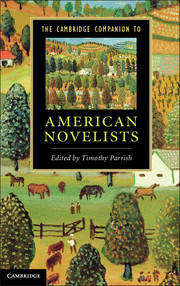Book contents
- Frontmatter
- Contents
- Contributors
- Introduction
- 1 James Fenimore Cooper
- 2 Nathaniel Hawthorne
- 3 Herman Melville
- 4 Harriet Beecher Stowe
- 5 Mark Twain
- 6 Henry James
- 7 Edith Wharton
- 8 Theodore Dreiser
- 9 Willa Cather
- 10 F. Scott Fitzgerald
- 11 Ernest Hemingway
- 12 William Faulkner
- 13 Henry Roth
- 14 Djuna Barnes
- 15 Zora Neale Hurston
- 16 Richard Wright
- 17 Raymond Chandler
- 18 Ralph Ellison
- 19 J. D. Salinger
- 20 Patricia Highsmith
- 21 Vladimir Nabokov
- 22 Jack Kerouac
- 23 Saul Bellow
- 24 Kurt Vonnegut
- 25 John Updike
- 26 Thomas Pynchon
- 27 Toni Morrison
- 28 Philip Roth
- 29 Don DeLillo
- 30 Cormac McCarthy
- Guide to Further Reading
- Index
- References
1 - James Fenimore Cooper
Published online by Cambridge University Press: 05 December 2012
- Frontmatter
- Contents
- Contributors
- Introduction
- 1 James Fenimore Cooper
- 2 Nathaniel Hawthorne
- 3 Herman Melville
- 4 Harriet Beecher Stowe
- 5 Mark Twain
- 6 Henry James
- 7 Edith Wharton
- 8 Theodore Dreiser
- 9 Willa Cather
- 10 F. Scott Fitzgerald
- 11 Ernest Hemingway
- 12 William Faulkner
- 13 Henry Roth
- 14 Djuna Barnes
- 15 Zora Neale Hurston
- 16 Richard Wright
- 17 Raymond Chandler
- 18 Ralph Ellison
- 19 J. D. Salinger
- 20 Patricia Highsmith
- 21 Vladimir Nabokov
- 22 Jack Kerouac
- 23 Saul Bellow
- 24 Kurt Vonnegut
- 25 John Updike
- 26 Thomas Pynchon
- 27 Toni Morrison
- 28 Philip Roth
- 29 Don DeLillo
- 30 Cormac McCarthy
- Guide to Further Reading
- Index
- References
Summary
James Fenimore Cooper (1789–1851) published his first novel in 1820, and his last, thirty-second novel in 1850. During most of his three-decade career he was among the world’s most famous and, particularly in the 1820s, widely read writers. By the twentieth century he was best known as the author of The Leather-Stocking Tales, five novels about Natty Bumppo, a hunter, woodsman, and frontier warrior whose closest friendship is with Chingachgook, a chief of the dispossessed Delaware tribe. Variously called Leather-stocking, Hawkeye, Pathfinder, and Deerslayer, Natty has often been cited as the first quintessentially American literary hero, and the Tales, set against historical contexts that range from the pre-Revolutionary fighting between England and France to the Lewis and Clark Expedition, have struck many as a kind of prose epic of early American life. Natty’s adventures in the woods are often drenched in violence and suspense. Cooper’s own heroism is harder to see, especially so long after the fact. We are used to thinking of the United States as the world’s great superpower, but when Cooper began writing the nation was still struggling with its status as a former colony of Great Britain, the superpower of that era. Cooper was the first American author to earn a living writing fiction, yet his work also reveals how much a postcolonial culture has to contend with in its quest for nationality.
Cooper’s first Leather-Stocking Tale was his third novel, The Pioneers, published in 1823. The story it tells begins on Christmas Eve, that moment on which for Christians human history pivots from the old world defined by Adam’s fall and Mosaic law to the new one brought forth by the birth of a savior who opens up the possibility of redemption. The setting is an upstate New York village called Templeton, which is based very closely on Cooperstown, the settlement founded by the novelist’s father in the 1780s and the scene of his own childhood. Natty appears in the book’s first chapter. This initial appearance gives little hint of the role he ended up playing in either Cooper’s career or American literature: he is an old man who soon disappears into the woods, while the narrative moves forward into the town where “the pioneers” are busy civilizing the wilderness.
- Type
- Chapter
- Information
- The Cambridge Companion to American Novelists , pp. 1 - 10Publisher: Cambridge University PressPrint publication year: 2012



